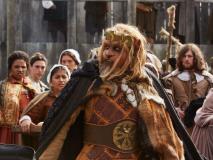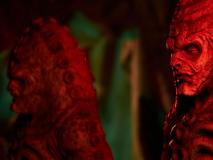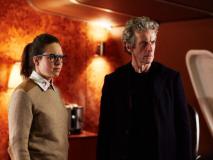An Unearthly Series - The Origins of a TV Legend
Wednesday, 12 December 2012 - Reported by Marcus

 The sixth in our occasional series marking the 50th anniversary of events leading to the creation of a true television legend.
The sixth in our occasional series marking the 50th anniversary of events leading to the creation of a true television legend.The story so far . . .
In the summer of 1962, the BBC commissioned a report into identifying specific science-fiction stories suitable for adapting for television.
The report started events that would lead to the transmission of the first episode of Doctor Who. Today, we examine the career of the man who was to reinvigorate BBC television drama and sow the seeds for an icon of the genre.
 If there is one man who can claim to be the true father of Doctor Who, one man without whose inspiration, guidance, and care the series would never have been made, then that man is Sydney Newman, who joined the BBC on Wednesday 12th December 1962, exactly 50 years ago today. A brash, outspoken Canadian, his arrival at the BBC was a shock for an establishment more used to employing products of the country's public schools and university system. He arrived with a distinguished track record of success in production on both sides of the Atlantic, and with a brief to shake up the Corporation's drama department and bring it into the 1960s.
If there is one man who can claim to be the true father of Doctor Who, one man without whose inspiration, guidance, and care the series would never have been made, then that man is Sydney Newman, who joined the BBC on Wednesday 12th December 1962, exactly 50 years ago today. A brash, outspoken Canadian, his arrival at the BBC was a shock for an establishment more used to employing products of the country's public schools and university system. He arrived with a distinguished track record of success in production on both sides of the Atlantic, and with a brief to shake up the Corporation's drama department and bring it into the 1960s.The Early Years:
Sydney Cecil Newman was born in Toronto on 1st April 1917 to a Russian Jewish immigrant father. His interest in art and the movies led him to attempt a career designing film posters, before switching to working in the film industry itself. A trip to Hollywood in 1938 led to an offer from the Walt Disney Company, a role he was unable to take up because of work permit issues. He returned to his native country, and during the Second World War he joined the National Film Board of Canada, first as an editor and later as a producer. He produced many documentaries and propaganda films during the war, and continued to work for the NFB in the post-war era. By 1952 he had produced some 300 short films, many of which were for Canada's government. His excellence in the field led to him being appointed Supervising Director of Features, Documentaries, and Outside Broadcasts for the Canadian Broadcasting Corporation (CBC) in 1952, where he was involved in producing some of the earliest outside broadcasts on Canadian television, including early episodes of the iconic Hockey Night in Canada and the first Canadian Football League game to be shown on television. Despite having limited experience in drama, he was made Supervisor of Drama Production in 1954, and he used the role to encourage young writers and directors, including William Kotcheff and Arthur Hailey.
Among his productions for CBC was the highly successful Canadian Television Theatre presentations, and his work was being increasingly admired at home and abroad, including in Britain where several of his CBC productions were screened by the BBC. In an interview he explained that it was during a visit to the UK that he realised the kind of drama he wanted to produce when seeing John Osborne's play Look Back In Anger with then Head of BBC TV Drama Michael Barry. However, it was to be Howard Thomas - managing director of one of the new ITV network franchise holders, Associated British Corporation (ABC) - who decided Newman could provide him with the type of contemporary drama he wanted to broadcast, and recruited him to ABC in 1958.
Becoming Head of Drama at ABC, Newman took over the production of the popular Armchair Theatre anthology play series, networked nationally on Sunday evenings to huge audiences and which he insisted should use only original material that had been penned for television. He commissioned plays for the series by writers such as Alun Owen, Harold Pinter, and Clive Exton. Newman also devised a thriller series called Police Surgeon, starring Ian Hendry. Although not a success, Newman used elements from the series, including its star, to create The Avengers, a programme that would go on to achieve international success.
While at ABC, he also produced the children's science-fiction serial Target Luna and its three spin-offs - Pathfinders In Space, then Pathfinders To Mars, and finally Pathfinders To Venus. The four series, comprising 27 episodes, were written by Malcolm Hulke and Eric Paice and centred on the space exploits of the Wedgwood family. Actors who appeared in the different series included Michael Craze, Bernard Horsfall, Gerald Flood, and George Coulouris. The shows aired between April 1960 and April 1961, with the last series being the most ambitious and whose complexity and need to keep videotape editing to a minimum saw the decision made to have live action performed in the electronic studio and visual effects done on film. During the summer of 1961, a sci-fi version of Armchair Theatre was proposed by story editor Irene Shubik, and between June and September 1962 the resulting anthology series Out Of This World was shown, consisting of 13 one-hour dramas, with an extra introductory one - entitled Dumb Martian, produced by Newman - shown in the Armchair Theatre slot six days before Out Of This World started.
Arrival at the BBC:
Newman's success at ITV led to him being head-hunted by the BBC, and in 1961 he was offered the role of Head of Drama by the Corporation's Director of Television, Kenneth Adam. Although he accepted the position, he was forced by ABC to fulfil his contract, finally leaving the commercial network to take up his new appointment in December 1962. In a later interview he stated:I'll be perfectly frank. When I got to the BBC and I looked my staff over I was really quite sick, because most of the directors there were people whose work I just did not like. I thought it was soft and slow and had no edge. Believe me, I had a bad Christmas, because I didn't know what to do - how to change those people who were stuck in their old ways, many of them having done their first television work at Alexandra Palace in 1938! Nice guys, willing guys, but most of them were just rigid!
He would spend five years with the BBC, but the influence of his tenure would ripple throughout the decades. While at the Corporation, he would oversee the arrival of new anthology series The Wednesday Play - a BBC equivalent of Armchair Theatre. He employed the likes of Dennis Potter, Jeremy Sandford, and Ken Loach, and under his watch seminal plays such as Cathy Come Home and Up the Junction were produced, tackling serious social issues of the day. Series produced under his aegis included the fantastical, Verity Lambert-produced Adam Adamant Lives!, the first two series of sci-fi anthology drama Out Of The Unknown (both produced by Shubik - now also working at the BBC), and legendary costume drama The Forsyte Saga - which became one of the most acclaimed and popular productions of his era, watched by 100 million people in 26 countries.
But it is for Doctor Who, now approaching its fiftieth anniversary, for which he remains best-known.
Future Head of Drama Shaun Sutton would comment in his book The Largest Theatre In The World:
Sydney Newman . . . burst into BBC Television Drama at its moment of expansion, seized the opportunity, and set a match to a dramatic bonfire that has warmed us all since.
Post-BBC:
Rather than having his contract renewed, Newman instead left the BBC to pursue a career as a film producer with Associated Film Producers, but no projects were to reach fruition and after being paid off when EMI took over in 1970 he decided to return to Canada.Back home, he became Acting Director of the Broadcast Programmes Branch at the Canadian Radio-Television Commission, and later that year was appointed Government Film Commissioner and Chairman of the National Film Board of Canada. He continued to have a strong influence in the media, though more in an advisory rather than hands-on role. In 1981 he was awarded the Order of Canada, the country's highest civilian honour.
After the death of his wife, Newman returned to the UK and worked for a time at Channel 4 - and was also asked by BBC1 Controller Michael Grade in 1986 about how to revamp Doctor Who, though this was never taken further. He formally retired back to Canada, where he died of a heart attack in Toronto on 30th October 1997.


SOURCES: Doctor Who: The Early Years (Bentham; 1986); Encyclopedia of TV Science Fiction (Fulton; 2000); The Handbook (Howe, Walker, Stammers; 2005); The Creator (DWAS; 1998); Doctor Who: The Unfolding Text (Tulloch, Alvarado; 1983); Wikipedia; Who's Who























